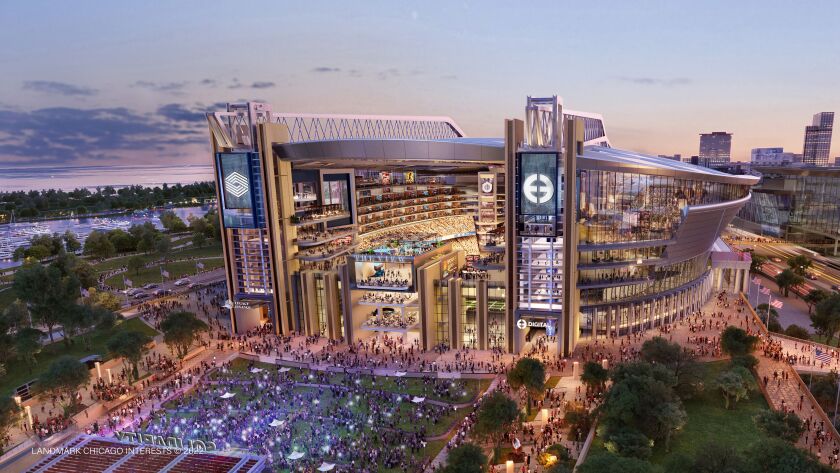The Bears’ decision to have a surveyor examine the south parking lot of Soldier Field, as a source confirmed Thursday, is the latest example of the team exploring options for a new stadium beyond Arlington Heights.
This is not necessarily a sign of progress toward a decision — surveying is typically part of a rudimentary information-gathering process. It is, however, the first time since Arlington Heights emerged as an option that the Bears have looked to the lakefront as a possible new venue.
“As we stated in September earlier this year, we want to appropriately explore all opportunities across Chicagoland for the development of a world-class stadium,” the Bears said in a statement Thursday.
The Bears closed escrow on their $197 million deal to buy the 326-acre Arlington International Racecourse site in February. By June, shortly after receiving permission to demolish the racetrack, the Bears were pushing back against property taxes at the site. They said their plan for a $2.5 billion domed stadium — plus adjacent hotels, restaurants and shopping — was at risk. Arlington Heights no longer remained their singular focus.
Soon afterward, the Bears met with Naperville Mayor Scott Wehrli and Chicago Mayor Brandon Johnson. Waukegan also offered to pitch the Bears on building a stadium there.
In a letter to season ticket holders in September, new Bears president and CEO Kevin Warren — who agreed to join the Bears just weeks before escrow closed — said the team was “thankful for the vision” provided by Johnson in meetings and remained engaged with Arlington Heights.
In 2022, then-Mayor Lori Lightfoot floated the possibility of adding a dome on top of Soldier Field, something the Bears dismissed by saying they were focused on Arlington Heights.
The Bears are renters at Soldier Field, which is owned by the Chicago Park District. The team’s lease runs through 2033. The stadium was renovated in 2003 for $632 million.

A rendering released by the city in 2022 shows a renovated Soldier Field with a dome added.
Landmark Development
Jason Lee, a senior Johnson adviser, said the city did not recommend the parking lot as a site for a new stadium. According to Lee, Johnson said only that the city was interested in working with the team on other Chicago sites besides Soldier Field, and encouraged the Bears to look at options in the city. There are, Lee acknowledged, only a few suitable locations.
As for whether the mayor would expend political capital to help with the cost of a new stadium — and even do so before the bonds for the Soldier Field renovation are paid off — Lee called such speculation “premature” but would not rule out that option.
Johnson has held several meetings with Warren to try to build the kind of trust and rapport that has not existed before between the Bears and City Hall.
If Johnson is willing to help the Bears build a new stadium long before retiring the existing bonds, there are only a few city sites large enough to handle the massive development the Bears envision.
The South Loop site at Clark and Roosevelt known as “The 78” is bisected by an active railroad track, and the University of Illinois is building an academic and research hub there. The contaminated South Works site near 85th and South Shore Drive that formerly housed U.S. Steel has bedeviled every developer who has ever tried to tackle it.
That leaves the old Silver Shovel dump site at Roosevelt and Kostner, the old Finkl Steel site in the middle of Lincoln Park, the now-troubled Lincoln Yards project and McCormick Place East.
Friends of the Parks, a group that advocates for lakefront protection, contends that both the McCormick Place site and the south parking lot would violate an ordinance protecting the lakefront from new development.
Juanita Irizarry, who this week announced she will soon step down as executive director of Friends of the Parks, advised the Bears to save their time and money.
Irizarry’s group also led a legal battle that forced Star Wars movie mogul George Lucas to cancel plans to build a $743 million museum on those same 17 acres.
The lakefront “belongs to the people” and cannot be used for new construction of any kind, Irizarry said Thursday.
“The public trust doctrine applies today the same way that it did when George Lucas tried to build on this site,” Irizarry said. “Our lakefront is not available for development in the private interest. It is surprising that they would even consider it. Anyone who is aware of the history would imagine that their viability study would have to include the certainty of a lawsuit from Friends of the Parks to protect against development on our lakefront.”
Chicagoan Marc Ganis, who has advised numerous NFL teams on stadium financing, said the shortage of available stadium sites within the city limits is why any conversation always returns to the south parking lot.
“Friends of the Parks are powerful. But if you’ve committed to looking at all options in the city to build a new stadium, you can’t ignore that site. It may not work out,” Ganis said.
“Friends of the Parks may block it,” Ganis added. “But if you’ve made a commitment to the mayor that you will, in good faith, look at all potential sites, there are only so many of them.”






